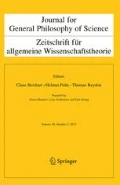Abstract
Some problems rarely discussed in traditional philosophy of science are mentioned: The empirical sciences using mathematico-quantitative theoretical models are frequently confronted with several types of computational problems posing primarily methodological limitations on explanatory and prognostic matters. Such limitations may arise from the appearances of deterministic chaos and (too) high computational complexity in general. In many cases, however, scientists circumvent such limitations by utilizing reductional approximations or complexity reductions for intractable problem formulations, thus constructing new models which are computationally tractable. Such activities are compared with reduction types (more) established in philosophy of science.
Similar content being viewed by others
REFERENCES
Blum, L., Shub, M. and Smale, S.: 1989, 'On a Theory of Computation and Complexity over the Real Numbers:NPCompleteness, Recursive Functions and Universal Machines', Bulletin of the American Mathematical Society 21, 1–46.
Costa, N. C. A. da, and Doria, F. A.: 1991, 'Undecidability and Incompleteness in Classical Mechanics', International Journal of Theoretical Physics 30, 1041–1073.
Costa, N. C. A. da, and Doria, F. A.: 1994a, 'Suppes Predicates and the Construction of Unsolvable Problems in the Axiomatized Sciences,' in: P. Humphreys (ed.), Patrick Suppes: Scientific Philosopher, Kluwer Academic Publishers, Dordrecht/Boston/London, Vol. 2, pp. 151–193.
Costa, N. C. A. da, and Doria, F. A.: 1994b, 'G¨odel Incompleteness in Analysis, with an Application to the Forecasting Problem in the Social Sciences', Philosophia Naturalis 31, 1–24.
Costa, N. C. A. da, Doria, F. A. and Furtado do Amaral, A. F.: 1993, 'Dynamial SystemsWhere Proving Chaos Is Equivalent to Proving Fermat's Conjecture', International Journal of Theoretical Physics 32, 2187–2206.
Coven, E., Kan, I., and Yorke, J. A.: 1988, 'PseudoOrbit Shadowing in the Familiy of Tent Maps', Transactions of the American Mathematical Society 308, 227–241.
Haken, H.: 1990, Synergetik, Eine Einf¨uhrung. Nichtgleichgewichts-Phasenübergänge und Selbstorganisation in Physik, Chemie und Biologie, Springer, Berlin/Heidelberg/New York.
HoyningenHuene, P.: 1992, 'On the Way to a Theory of Antireductionist Arguments', in: A. Beckermann, H. Flohr, J. Kim (eds.), Emergence or Reduction? Essays on the Prospects of Nonreductive Physicalism, de Gruyter, Berlin/New York, pp. 289–301.
Kowalski, M. A. and Sielski, W.: 1988, 'Approximation of Smooth Periodic Functions in Several Variables', Journal of Complexity 4, 356–372.
Laidler, K. J.: 1985, 'Chemical Kinetics and the Origins of Physical Chemistry', Archive for History of Exact Sciences 32, 43–75.
Leiber, T.: 1996a, 'Chaos, Berechnungskomplexit¨at und Physik: Neue Grenzen wissenschaftlicher Erkenntnis?' Philosophia Naturalis 33, 23- 54. Leiber, T.: 1996b, Kosmos, Kausalit ¨at und Chaos. Naturphilosophische, erkenntnistheoretische und wissenschaftstheoretische Perspektiven, Ergon Verlag, Würzburg.
Leiber, T.: 1998, 'On the Actual Impact of Deterministic Chaos', Synthese 113(3) (in press).
Mainzer, K.: 1997, Thinking in Complexity. The Complex Dynamics of Matter, Mind and Mankind, Springer, Heidelberg/New York/Tokyo.
Pearce, D.: 1982, 'Logical Properties of the Structuralist Concept of Reduction', Erkenntnis 18, 307–333.
Peitgen, H.O., Jürgens, H., Saupe, D.: 1994, Chaos - Bausteine der Ordnung, KlettCotta/ Springer, Stuttgart/Berlin/Heidelberg/New York.
Sarkar, S.: 1992, 'Models of Reduction and Categories of Reductionism', Synthese 91, 167–194.
Scheibe, E.: 1993, 'A Theory of Reduction in Physics', in: J. Earman, A. I. Janis, G. J. Massey, N. Rescher (eds.), Philosophical Problems of the Internal and External Worlds: Essays on the Philosophy of Adolf Grünbaum, University of Pittsburgh Press, Pittsburgh, pp. 249–271.
Thomas, H. and Leiber, T.: 1994, 'Determinismus und Chaos in der Physik', in:K. Mainzer, W. Schirmacher (Hrsg.), Quanten, Chaos und D¨amonen. Erkenntnistheoretische Aspekte der modernen Physik, B.I.Wissenschaftsverlag, Mannheim, pp. 147–207.
Traub, J. F., Wasilkowski, G. W., and Woźniakowski, H.: 1988, InformationBased Complexity, Academic Press, New York.
Wershulz, A. G.: 1991, The Computational Complexity of Differential and Integral Equations, Oxford University Press, Oxford.
Rights and permissions
About this article
Cite this article
Leiber, T. Deterministic Chaos and Computational Complexity: The Case of Methodological Complexity Reductions. Journal for General Philosophy of Science 30, 139–141 (1999). https://doi.org/10.1023/A:1008209231777
Issue Date:
DOI: https://doi.org/10.1023/A:1008209231777




